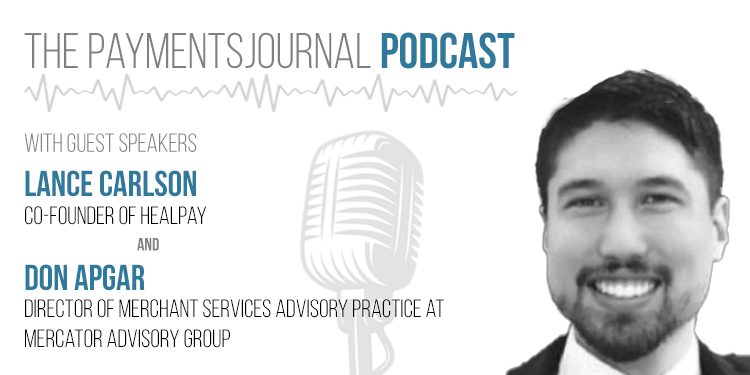Bill collections still uses many manual, paper-based, and inefficient processes. However, that is beginning to change as fintech digital innovations are transforming the collections space and making it easier for consumers to pay off debt quickly and seamlessly.
To find out how, PaymentsJournal sat with Don Apgar, Director of Merchant Services Advisory Practice at Mercator Advisory Group, and Lance Carlson, Co-founder of HealPay.
From Antiquity to Modernity
There is still “a lot of antiquated technology” in the bill collections space, noted Carlson. He added that a common practice in the industry until recently involved storing a spreadsheet with names and overdue account balances on USB drives, and one party would sell the stored information to another that would then collect the debts. This, of course, is a laborious, manual process rife with human error, often leading to mistakes and confusion. Overall, the collections process is often a frustrating one for both consumers and businesses trying to get the debt paid.
“However, you are starting to see things modernizing,” said Carlson. “We’re starting to automate many of these manual processes.”
HealPay, for example, offers a consumer-facing digital portal that enables users to set up one-time or recurring payments with merchants or collection firms without having to log in.
Businesses and collection firms have access to a portal that integrates with leading receivables and claims management software, automates formerly manual processes, and uses data analytics to offer intelligent payment options for partial, full and minimum payments.
A Better Consumer Experience Leads to More Paid Bills
While such tech innovation makes things easier for businesses and creates a much better experience for consumers, does it lead to more debt being repaid? That was a question Apgar posed: “How does a friendlier approach to the consumer result in more collections?”
Carlson began by acknowledging that a segment of the populace simply will not pay past-due bills and “you can’t force them to pay bills if they don’t want to,” but that most consumers do not fall into this category. “Most people do want to pay down their past-due bills, and they feel better when they do so,” he added.
For many consumers, getting a letter or a phone call from a collection agency — which can sound threatening — scares them and makes them less inclined to pay the money owed. But tech innovation that allows consumers to pay their debt from the comfort of their own home on the device of their choice makes them much more likely to do so, Carlson said.
Giving flexible payment options also makes consumers more likely to pay overdue bills. Platforms such as HealPay enable businesses to offer consumers repayment installment plans, say, over the course of 12 or 18 months. Such options are much more palatable to consumers than asking them to make one large payment at once.
“People’s life circumstances always change and maybe right now they can’t pay off $1,000 all at once,” said Carlson. “But if they have customized payment options that are easy and convenient and that enable them to repay as soon as possible, that’s a much better option.”
Finally, he added that many consumers may have overdue bills simply because they forgot about them by mistake. But receiving a possibly ominous-sounding letter or phone call about this debt is not the best way to proceed. Instead, offering consumers a secure and easy digital means of repaying means they will be much more likely to pay the bill.
Ultimately, offering consumers quick and easy digital methods to pay their debt leads to a much higher rate of repayment, Carlson said.
The Power of Orchestration
While this digital ideal is surely better than the traditional methods of bill collection, the digital approach requires orchestration between disparate systems and payment mechanisms.
“How do you orchestrate payments across many different industries, dealing with merchants of different sizes?” Apgar asked.
Carlson acknowledged the task is difficult, not only dealing with different data but complying with many different regulations as well. There are many statutes companies that store credit cards (or any kind of payment card) information must adhere to. For example, the Payment Card Industry Data Security Standard (PCI DSS) requires companies that accept, process, store, or transmit credit card information to follow a stringent set of security standards to ensure they are maintaining a secure environment.
Luckily, tech can help with the orchestration required. HealPay works with Spreedly, a payments orchestration platform that allows clients to use its PCI-compliant data vault that tokenizes and secures payment methods. Spreedly uses APIs to allow clients such as HealPay to access third-party payment services and enable and optimize digital transactions.
The Spreedly platform enables HealPay to operate much more efficiently and process payments quickly as opposed to “having to build a system where we are storing credit card information in each of our partner’s data vaults,” added Carlson
Treating People Like Humans
Digital innovation in the bill collections space is creating an environment where consumers feel better about paying back overdue bills, turning what has long been an emotionally stressful experience into something better.
“You have to treat people like humans and with respect,” Carlson said.
Doing that turns bill collections from being a potentially embarrassing experience for consumers to a point of pride where consumers feel good knowing they are paying off debt at their own pace.
“People, by and large, want to pay their bills,” Apgar concluded. “If you make it easier for them to do so, they’ll do it more frequently.”












